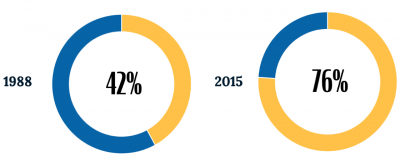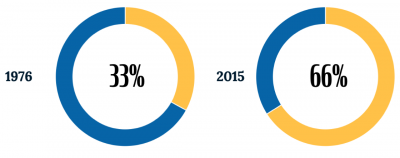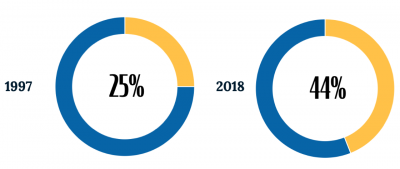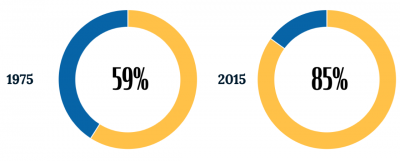Courage to Learn: Agriculture
Over the past 40 years, the American food supply chain has become concentrated in the hands of a few large multinationals, which serve as middlemen in everything from seed genetics to hog processing to supermarkets. This concentrated power erodes the earnings and freedom of farmers, farm workers, and rural communities that depend on agriculture. Recent administrations, despite pledges to redress this situation, failed to do so.
Key Stats
Market share of the largest four beef packing firms:

Market share of the largest four soybean seed firms:

Market share of the largest four hog processing firms:

Market share of the top four grocers:

Market share of the largest four corn seed firms:

Key Facts
- In 1990, ranchers received 59 cents of each dollar spent on beef, while retailers received 33 cents; today, those figures are 38 cents and 51 cents, respectively.
- Since 2014, the price farmers receive for milk has fallen by 40 percent, 55 percent below the average farm’s break-even point. 4,600 dairy farms have closed each year for two years.
- In the chicken industry, approximately 90 percent of the 9 billion chickens raised every year in the U.S. come from contract farming. Processors exert intense pressure on contract farmers and coerce them into accepting abusive or unfair growing arrangements.
Key Corporations
- Bayer, Tyson Foods, JBS, Smithfield, Pilgrim’s Pride, Dairy Farmers of America, Dean Foods, Walmart, Kroger, Ahold-Delhaize, John Deere, Dow, Dupont, Corteva, Cargill, Syngenta, BASF, ADM, Cargill, Louis Dreyfus, Nestle, Pepsico, Kraft Heinz, Sodexo, Compass Group, Aramark
Recommended Policies
- Break up agribusiness monopolies in seeds, chicken, hog, and beef processing, and supermarkets.
- Hold the meatpacking industry accountable by strengthening inspections, slowing line speeds, promulgating stronger occupational and safety standards, and raising the pay of inspectors.
- Restore the Grain Inspection, Packers and Stockyards Administration.
- Address consolidation through the Farm Bill by using grain reserves and price floors to stabilize prices and discourage overproduction, capping subsidy payouts to large corporate farms, and expanding loan programs to support underserved farmers and ranchers, among other reforms.
- Reform the Checkoff program.
- Eliminate exemptions in labor law so that overtime, minimum wage, and rights to collective action rules apply to farmworkers.
Further Reading
- “Food and Power: Addressing Monopolization in America’s Food System” by Sarah Miller and Claire Kelloway, March 2019
- “The Food System: Concentration and Its Impacts” by Mary K. Hendrickson, Philip H. Howard, Emily M. Miller, and Douglas H. Constance, November 2020
- “A Fair Deal for Farmers” by Zoe Willingham and Andy Green, May 2019